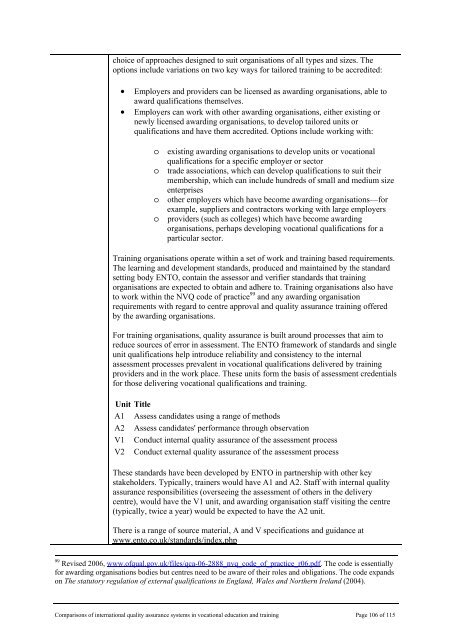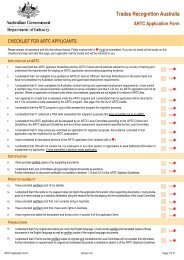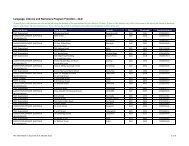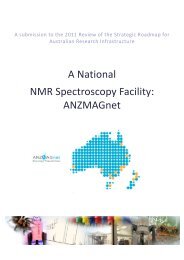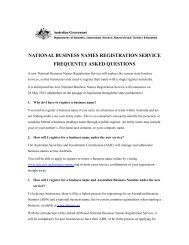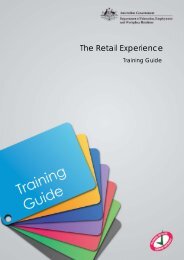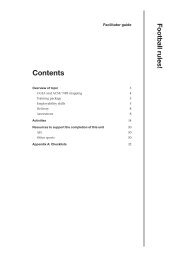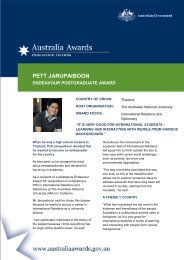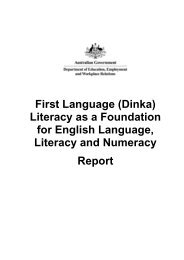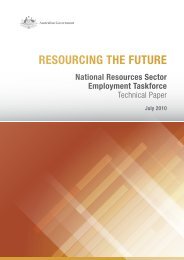Review - Department of Innovation, Industry, Science and Research
Review - Department of Innovation, Industry, Science and Research
Review - Department of Innovation, Industry, Science and Research
You also want an ePaper? Increase the reach of your titles
YUMPU automatically turns print PDFs into web optimized ePapers that Google loves.
choice <strong>of</strong> approaches designed to suit organisations <strong>of</strong> all types <strong>and</strong> sizes. The<br />
options include variations on two key ways for tailored training to be accredited:<br />
• Employers <strong>and</strong> providers can be licensed as awarding organisations, able to<br />
award qualifications themselves.<br />
• Employers can work with other awarding organisations, either existing or<br />
newly licensed awarding organisations, to develop tailored units or<br />
qualifications <strong>and</strong> have them accredited. Options include working with:<br />
o existing awarding organisations to develop units or vocational<br />
qualifications for a specific employer or sector<br />
o trade associations, which can develop qualifications to suit their<br />
membership, which can include hundreds <strong>of</strong> small <strong>and</strong> medium size<br />
enterprises<br />
o other employers which have become awarding organisations—for<br />
example, suppliers <strong>and</strong> contractors working with large employers<br />
o providers (such as colleges) which have become awarding<br />
organisations, perhaps developing vocational qualifications for a<br />
particular sector.<br />
Training organisations operate within a set <strong>of</strong> work <strong>and</strong> training based requirements.<br />
The learning <strong>and</strong> development st<strong>and</strong>ards, produced <strong>and</strong> maintained by the st<strong>and</strong>ard<br />
setting body ENTO, contain the assessor <strong>and</strong> verifier st<strong>and</strong>ards that training<br />
organisations are expected to obtain <strong>and</strong> adhere to. Training organisations also have<br />
to work within the NVQ code <strong>of</strong> practice 99 <strong>and</strong> any awarding organisation<br />
requirements with regard to centre approval <strong>and</strong> quality assurance training <strong>of</strong>fered<br />
by the awarding organisations.<br />
For training organisations, quality assurance is built around processes that aim to<br />
reduce sources <strong>of</strong> error in assessment. The ENTO framework <strong>of</strong> st<strong>and</strong>ards <strong>and</strong> single<br />
unit qualifications help introduce reliability <strong>and</strong> consistency to the internal<br />
assessment processes prevalent in vocational qualifications delivered by training<br />
providers <strong>and</strong> in the work place. These units form the basis <strong>of</strong> assessment credentials<br />
for those delivering vocational qualifications <strong>and</strong> training.<br />
Unit Title<br />
A1 Assess c<strong>and</strong>idates using a range <strong>of</strong> methods<br />
A2 Assess c<strong>and</strong>idates' performance through observation<br />
V1 Conduct internal quality assurance <strong>of</strong> the assessment process<br />
V2 Conduct external quality assurance <strong>of</strong> the assessment process<br />
These st<strong>and</strong>ards have been developed by ENTO in partnership with other key<br />
stakeholders. Typically, trainers would have A1 <strong>and</strong> A2. Staff with internal quality<br />
assurance responsibilities (overseeing the assessment <strong>of</strong> others in the delivery<br />
centre), would have the V1 unit, <strong>and</strong> awarding organisation staff visiting the centre<br />
(typically, twice a year) would be expected to have the A2 unit.<br />
There is a range <strong>of</strong> source material, A <strong>and</strong> V specifications <strong>and</strong> guidance at<br />
www.ento.co.uk/st<strong>and</strong>ards/index.php<br />
99 Revised 2006, www.<strong>of</strong>qual.gov.uk/files/qca-06-2888_nvq_code_<strong>of</strong>_practice_r06.pdf. The code is essentially<br />
for awarding organisations bodies but centres need to be aware <strong>of</strong> their roles <strong>and</strong> obligations. The code exp<strong>and</strong>s<br />
on The statutory regulation <strong>of</strong> external qualifications in Engl<strong>and</strong>, Wales <strong>and</strong> Northern Irel<strong>and</strong> (2004).<br />
Comparisons <strong>of</strong> international quality assurance systems in vocational education <strong>and</strong> training Page 106 <strong>of</strong> 115


